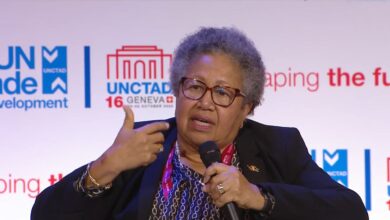(CARICOM Secretariat, Turkeyen, Greater Georgetown, Guyana) The Caribbean Community (CARICOM) has stepped up its meetings as it continues its negotiations process in the run up to the 15th Meeting of the Conference of Parties (COP15) to the United Nations Framework Convention on Climate Change (UNFCCC) set for December 7-18 in Copenhagen, Denmark.
The series of meetings forms part of the Community’s strategy to highlight its priorities and position itself to ensure that the Region’s issues are fully addressed at Copenhagen.
Small Island Developing States (SIDs), including the Caribbean Region, are among the most vulnerable to the threats and challenges of Climate Change and although they contribute less than one percent of global Green House Gas Emissions, they are already experiencing the adverse effects of Climate Change, including sea level rise and natural disasters.
The outcomes of this land mark Conference therefore is of vital importance to CARICOM as the Community will need to ensure that the targets in the new Agreement at COP 15 are favourable to its Member States.
Against this backdrop, the CARICOM Secretariat and the Caribbean Community Climate Change Centre (CCCCC) are hosting another slate of meetings; this time at the Ministerial Level, for the Region’s Foreign Affairs Practitioners and Technocrats on 14 September 2009 and a Ministerial Meeting on 15 September 2009 in Saint Lucia, to further define the Region’s Climate Change priorities for the negotiations leading up to, and at Copenhagen.
One of the strong calls that the Community had been making since the start of preparatory activities for negotiations is that the Caribbean should go into the negotiations with a common position on Climate Change, particularly in relation to six critical building blocks that the Community feels must be addressed in the negotiations: a shared vision on Climate Change; the reduction of Green House Gas (GHG) emissions; mitigation and adaptation; the transfer of technology; capacity building and Finance.
The ministerial Conference in Saint Lucia therefore is a significant step in the journey to Copenhagen as it provides a platform on which the political directorate and other policy makers within the Region can become intimately involved in the negotiations processes; appreciate a better understanding of the key issues at stake and be able to give strong support to the positions of the negotiating teams.
Not only that, but the input of the Region’s major policy movers will prove invaluable as the Caribbean prepares itself for the much anticipated High Level Meeting on Climate Change with the United Nations Secretary-General on 22 September in New York, where they will seek to build the political will and momentum for the political discussions at the Copenhagen Conference.
Leading this charge is the Alliance of Small Island Developing States (AOSIS) comprising forty-three small island and low-lying coastal developing countries which is the main body representing the concerns of Small Island Developing States at the UNFCCC meetings, and as such, this Ministerial Meeting will provide for the AOSIS, further recommendations for its upcoming Consultations in New York on 21 September.
The Ministerial meeting at Bay Gardens Hotel in Saint Lucia on Tuesday will also clarify, among other issues, the Region’s strategic and policy issues in the Negotiations and will examine carefully, the challenges facing the region in the negotiations process. An analytical review of the positions of developed countries such as the United States, European Union, Japan; and major developing countries such as China, India and South Africa will be done to get a feel of the synergies as well as disparities between those countries’ and the Region’s positions. This will give the region a distinct advantage in fine-tuning its negotiation strategies.
The Ministerial Meeting will be addressed by Prime Minister of Saint Lucia, the Hon. Stephenson King, who has lead responsibility for Sustainable Development in the Quasi-Cabinet of the CARICOM Conference of Heads of Government and the CARICOM Secretary-General, HE Edwin W Carrington.
It is expected that all stakeholders will come away from this meeting with more clarity, stronger resolve and a more unified approach to the Region’s position for Copenhagen.
At COP-15, Heads of State and Government from the 191 Member States of the United Nations will try to reach a new global climate change agreement to replace the 1997 Kyoto Protocol which sets targets for the reduction of greenhouse gas emissions.
During the first round of the negotiations held in Bonn, Germany in June of this year, Caribbean negotiators emerged quite optimistic that based on the UNFCCC Text of the Draft Declaration for the New Agreement, significant common understanding had been built to facilitate the negotiations, when the UN Conference of Parties (COP 15) meet in Copenhagen.
Since then, the Caribbean has been working assiduously to build and sustain momentum even while advancing the dialogue for consensus around the six key issues.





